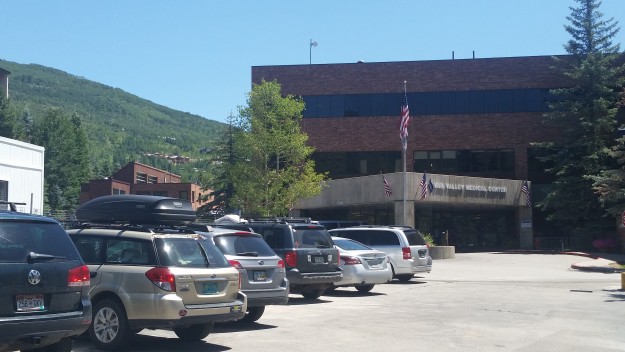Widgetized Section
Go to Admin » Appearance » Widgets » and move Gabfire Widget: Social into that MastheadOverlay zone
Reinsurance law a signifcant but small first step to fixing ski-town health care crisis

Forgive me for not celebrating quite as hard as the Dems down in Denver (and weirdly even Republican Sen. Cory Gardner) over Wednesday’s federal waiver that will allow Colorado to set up a reinsurance program that will bring down individual-market health insurance rates by as much as 30% next year in Eagle County and the rest of the Western Slope.

I wrote a story about it for the Vail Daily (re-posted below) in which I described a family of five making more than $117,000 a year in 2019 paying as much as $2,900 a month for an Anthem plan, with a $6,500 deductible to meet before any benefits kick in. That plan is likely to drop by as much as $900 a month in 2020 under the new reinsurance program.
That is great news, but it’s still an unaffordable plan that basically amounts to catastrophic coverage if you have to meet that high of a deductible. A relatively healthy family of five will get no real benefit with wellness visits or the occasional urgent care for the flu or broken bones. Everything will still be out of pocket after basically paying a second mortgage per month.
Now, the really good news for the approximately 3,000 people in Eagle County on the individual market – people who don’t get their insurance through their employer – is that if that same family of five made less than $117,000 a year in 2019, they qualified for Affordable Care Act tax credits that brought that monthly premium way down under $1,000 a month.
Trouble is, it’s actually really hard for a family of five to live on less than $117,000 a year in Eagle County, where the median home price is $735,000, rents have spun out of control thanks to price-gouging slumlords, Airbnb and VRBO, and everything from daycare to gas and groceries costs 30% more than the Front Range. The individual ACA income cap was $48,000.
And notice I don’t mention any other ACA-compliant plans on the market in Eagle County. That’s because Kaiser is pulling out at the end of the year, so your only real choices if you’re self-employed or don’t work for a company that helps with your health insurance is to roll the dice and go uninsured (a very risky proposition in an active, cold, mountainous place like this).
Or go with a plan that is not ACA-compliant. That’s what my family of five did in 2019. We still wound up paying $1,350 a month for four of us and another $200-plus a month for one of our kids who was denied for a very benign pre-existing condition that requires exactly zero treatment. And that’s the world Republicans want to take us back to.
While not successfully offering any sort of alternative, let alone passing anything despite controlling both chambers of Congress and the White House, the GOP – including Gardner — tried again and again to do away with the ACA, or Obamacare. All they really managed to do was strip away the individual mandate in their massive tax break for the wealthiest Americans.
That means there’s no tax penalty for going uninsured or getting a non-compliant plan like mine, but it also left the law open to a lawsuit from the state of Texas and 18 Republican attorneys general arguing the ACA, including all of its popular aspects such as protections for pre-existing conditions and children being able to stay on their parents’ plan until age 26, is in jeopardy.
The ACA also funds the majority of Colorado’s reinsurance program so the savings may just be for a year or two. Real, long-term help could come with actual stabilization of the ACA and real competition in underserved places like Eagle County. And that help may be coming – in the form of a Colorado public option and a local co-op – but not until 2021.
My insurance broker, whom I recommend to anyone in the same boat as us – Bethe Wright of the Wright Insurance Company (970-376-7444) – says the real trouble with Obamacare came in 2015 after the law’s adoption in 2014. That’s when the highly successful Colorado HealthOP co-op went under because money promised it from big insurance companies didn’t come through.
Every year after that, individual market plans went up by at least 25% a year. She’s dubious new co-ops not backed by big insurance carriers will be able to fix the system but agrees that anything providing relief to residents of Colorado’s high country, even if it’s temporary, is a good thing. Wright is supportive of Vail Health’s efforts to be a major part of the solution.
Our local hospital appears to be serious about helping ease costs, as quoted in my Vail Daily piece. Here’s more from Vail Health President and CEO Will Cook that didn’t make it into my Vail Daily story due to space constraints:
“The high cost of health care is an issue Vail Health is working to address with meaningful solutions,” Cook said. “To attack the cost of health care, we are going to improve population health by getting upstream from chronic health conditions and making sure folks are treated at the right place at the right time; fine-tune existing direct contracts for larger employers, which pass on highly reduced premiums to local workers and their families; offer better rates on the individual exchange; build a purchasing collaborative that would allow employers, self-insured entities and individuals to negotiate better rates; and provide more generous financial assistance for un- or under-insured patients. We are working diligently on all of these tactics and look forward to rolling out programs that will significantly improve the quality of life for the people who live, work and play here.”
And, as promised, here’s a re-post of my story about reinsurance in the Vail Daily:
Donovan: Reinsurance a response to financial crisis
But competition key to bringing down runaway health insurance rates
State Sen. Kerry Donovan on Wednesday was justifiably happy to help bring some long-overdue health-insurance relief to Colorado residents – especially those living in beleaguered mountain communities – when her signature reinsurance bill from last session cleared a key federal hurdle.

But the Vail Democrat knows the individual market rate relief from the federal 1322 waiver for HB 1188 could be short-lived and isn’t the long-term solution for skyrocketing premiums on the Western Slope.
For starters, the $9,000 a year in savings from the reinsurance program for the 3,000 or so people on the individual market in Eagle County – people who are self-employed or don’t get insurance through their employer – only applies to plans that comply with the Affordable Care Act.
On Colorado’s Connect for Health exchange, there’s only one ACA-compliant plan in Eagle County for 2020 (Anthem) after Kaiser announced in mid-June that it’s pulling out after just four years. Donovan also sponsored a state public option bill to create more competition, but it also requires a federal waiver and won’t kick in until 2021.
“The public option is where we’re hoping to create that competitive marketplace,” Donovan said. “This is a bill [reinsurance] that’s trying to respond to financial crisis in people’s households, but we still have a lot of work to actually address the driving costs of health care.”
In 2019, an ACA-compliant Anthem bronze plan for a family of five cost $2,900 a month with a whopping $6,500 annual deductible before any benefits kicked in. To be eligible for substantial ACA tax credits, that family of five had to make less than $117,000 ($48,000 for individuals).
With the stripping away in 2017 of the federal individual mandate that imposed a tax penalty for people not buying health insurance, that same family of five could get a non-compliant plan with lower deductibles for around $1,500 a month, but family members could be denied for pre-existing conditions. Those rates are unlikely to be affected by the reinsurance program.
“As reinsurance is part of the 1332 state innovation waiver process of the ACA — to waive certain provisions of the ACA for certain innovations — the reductions in premiums that will occur due to the approval of Colorado’s waiver for reinsurance will only apply to the ACA-compliant individual market plans, both on and off exchange,” said Vincent Plymell, communications manager for the Colorado Division of Insurance.
Then there’s the fact that the ACA itself, which funds most of the now nine state reinsurance programs around the nation, is in serious jeopardy as a federal court of appeals weighs a Texas case challenging the constitutionality of the law – also known as Obamacare – now that Congress stripped out the individual mandate. Donovan acknowledges how shaky reinsurance may be.
“Particularly when you look at the lawsuit coming out of Texas that’s aiming to take us backwards,” Donovan said. “When you think about that competing narrative, there is very little faith on my part that we can look to the federal government right now to solve health care.”
The Trump administration has endorsed the Texas lawsuit, also joined by 18 Republican attorneys general, which could eliminate the ACA entirely, including its popular protections for people with pre-existing conditions and its provisions allowing children under 26 to stay on their parents’ insurance.
Should that happen, the $163 million in federal funding for Colorado’s reinsurance program will go away, according to the Colorado Sun, and the combined state and hospital share of $87 million won’t be nearly enough to cover the $250 million overall cost of the program in 2020.
Reinsurance is basically insurance for insurance plans, providing state funding to guarantee coverage for the riskier individuals in the plan so the costs aren’t spread to everyone.
“We thank Sen. Donovan and other lawmakers for implementing legislation that will reduce insurance premiums for local individuals and families,” said Vail Health President and CEO Will Cook. “The majority of the reinsurance program will be funded by hospitals with the intent that the savings from the program must be passed along by insurance companies to consumers.”
Donovan likewise hopes the federal approval of Colorado’s reinsurance bill is a catalyst for deductibles to start coming down.
“You certainly would hope that with more assurity and stability in the market, [insurance companies] could start to look at where they have their copay levels, because that’s just an adjustment of them trying to make their budget work with whatever goal they’re going for, but the [reinsurance] bill doesn’t directly contemplate that.”
State Rep. Julie McCluskie, D-Dillon, who sponsored reinsurance in the House, calls the federal waiver a victory for the working class in mountain resort towns.
“Reinsurance is not the long-term health care solution, but it is a significant step towards taking some of the pressure off of our working families,” McCluskie said. Now other elements of the legislature’s moves last session need to kick in, including the public option and a bill she ran with Donovan and Rep. Dylan Roberts, D-Avon, to boost health-insurance co-ops.
“By January, 2020, we hope to have the Peak Health Alliance up and running, and coupled with some of the reductions we’re seeing with reinsurance, I hope that we hit even bigger reductions in health insurance premiums for our small business, large group and self-insured employers in the county,” McCluskie said, adding there’s currently dialogue with Vail Health on co-ops.
Several sources said a co-op along the lines of what’s happening in Summit County is on track for Eagle County in 2021.
“Our community absolutely needs relief from increasing health care costs, and hospitals play a pivotal role in addressing this complex issue,” Vail Health’s Cook said. “In the end, it comes down to utilization and rates. Utilization is how much people are using health care, and rates refer to how much hospitals and providers charge patients and insurance companies.”
David O. Williams
Latest posts by David O. Williams (see all)
- In governor’s primary race, Bennet, Weiser sparring over who is tougher on Trump - July 15, 2025
- The O. Zone: Battle for public lands just now heating up, much like our atmosphere - July 14, 2025
- Immigrant rights groups push Colorado AG Weiser for probes into violations of ICE collaboration law - July 11, 2025


